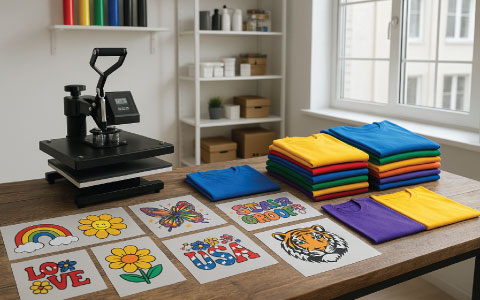If you’re just getting started with DTF printing or customizing apparel, you may be wondering:
Can I apply DTF transfers without a heat press?
Maybe you’re waiting on equipment, working with a limited budget, or just testing the waters. Whatever the case, let’s break down whether this is possible — and what your options are.
🔥 First, How Do DTF Transfers Work?
DTF (Direct-to-Film) printing involves printing a design onto a special film using DTF ink, applying adhesive powder, and then curing it before transferring it onto fabric. The transfer process typically requires high, consistent heat and even pressure — which is why a heat press is the industry standard.
👀 So, Is It Possible to Apply DTF Transfers Without a Heat Press?
High-quality DTF Transfers are versatile and usually can press onto clothing w/o a heatpress.

DTF Transfer By Size Custom Sheet Prints
Order custom DTF transfer sheets by size for vibrant, long-lasting prints on any fabric. Perfect for t-shirts, hoodies, tote bags, and more. Easy heat press application, no weeding required. Upload your design today!
🔧 1. Using a Home Iron
This is the most accessible method for beginners. And it’s possible to press DTF transfers with just your home iron!
How to do it:
- Preheat your iron (no steam).
- Place the garment on a flat, heat-safe surface.
- Position the DTF transfer film on the fabric.
- Cover it with parchment paper or a Teflon sheet.
- Press firmly, applying your body weight, for 15–20 seconds per area — section by section.
Pros:
- Easy and cheap
- No new equipment needed
Cons:
- Inconsistent pressure and heat
- Edges may peel or not adhere fully
- May not be durable after washing.
Decision: OK for test prints or hobby use, but not reliable for quality or resale.
💡 2. Cricut EasyPress or Similar Tools
These are designed for heat transfer vinyl (HTV), but some users have had success with DTF.
How to do it:
- Set the temperature (usually around 300–320°F)
- Pre-press the fabric to remove moisture
- Place the DTF film, cover it with parchment paper or a Teflon sheet, and press evenly
- Apply firm pressure for 15–20 seconds
Pros:
- More consistent than an iron
- Portable and beginner-friendly
Cons:
- Still lacks full-edge pressure
- Not built specifically for DTF
- Lower success rate on thicker fabrics
Decision: Better than an iron, but still not ideal for pro-level results.
🛠️ Why a Heat Press Is Still Your Best Bet
Even if you’re just starting out, a heat press offers:
- Even pressure across the entire design
- Accurate temperature control
- Long-lasting, professional results
- Fewer failed transfers (which saves money in the long run)
You don’t need to start with a $1,000 industrial press. There are great entry-level options under $200 that deliver solid results.

✅ Our Recommendation
If you’re just experimenting, go ahead and try with an iron or EasyPress — but manage your expectations.
If you’re planning to:
- Sell custom t-shirts
- Create bulk orders
- Offer consistent quality
…then investing in a basic heat press is 100% worth it.
You can print DTF transfers without a heat press — but it’s not ideal. For hobby use or test runs, try what you have. But for serious results, a heat press is the way to go.
Got questions? Drop them in the comments or reach out — we’re happy to help you get started!


Leave a Reply